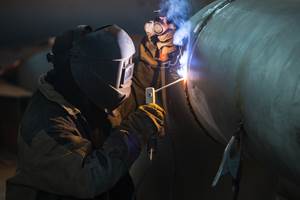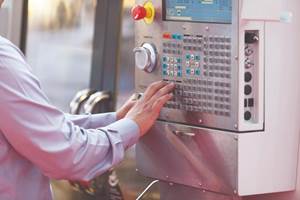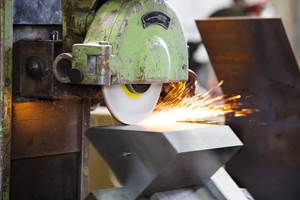Who's Counseling Whom?
How to make manufacturing attractive to career guidance counselors and parents is a challenge. Nobody has all the answers.
How to make manufacturing attractive to career guidance counselors and parents is a challenge. Nobody has all the answers. However, I can offer some helpful hints. Once students are aware of the hi-tech and high paying jobs, it's easy to encourage them to seek a career and education path in manufacturing.
Inviting counselors and parents to the International Manufacturing Technology Show (IMTS) in Chicago, September 6-13, is a step in the right direction. The booth displays do a good job of showcasing the benefits of being involved in all phases of manufacturing. The Student Summit is a great success.
All manufacturers should take a minute and call their local schools to encourage them to participate in programs such as this. Career counselors, human resource managers, school administrators and parents are unaware that today's manufacturing employee is a member of a highly trained, highly skilled workforce that operates sophisticated machinery. The antiquated picture of a factory as a dark, dirty and uncomfortable place to work has not been replaced in the counselors' imaginations with today's reality. They have not taken the time to visit a shop or factory lately.
These days, even an old factory is likely to have modern equipment and furnishings. From my experience making presentations to various high schools, community groups and civic associations, I find several major negative situations. Paraphrasing my opening remarks can best sum it up. After the required thank yous, I ask the audience to indulge me in a short "prayer." It goes like this:
"May the good Lord save and protect me from career counselors, who can't counsel and know nothing about careers; from human resource people, whose humanity is not always apparent and who wouldn't know a resource if it stood in front of them; from social workers who are not social and may not work for their clients' best interests; and last of all, save and protect me from meddling school administrators who have not been in a modern factory and are over zealous in efforts to send everyone to a four-year college. Now, if there is anyone here who I have not offended, please let me know and I'll see how I can include you, too."
The prayer sums up the problems we have on a several levels. The career counselors take pride, as well they should, in talking about how many students have gone to college. The human resource people are searching for people from across the country, rather than centering their attention on home-grown executives and managers.
The social workers insist on upgrading a person's standard of living to their own, rather than admitting that everyone can be happy in their own setting. And school administrators establish lofty curriculum without consideration for the many manufacturing and trade jobs calling for highly skilled, highly motivated persons.
Despite these misdirected intentions and efforts, factory and trade workers are making a very good living, have pride in their work and are obtaining the standard of living that appeals to them. A lot has to do with how we manage perceptions.
For example, several summers ago I wanted to fill the machining class at a community college. Of course, no young person wants to give up vacation time to go to school. However, after a long discussion with the Dean, I suggested we change the name of the summer school program to "Advanced Placement Program in Manufacturing Technology" and limit enrollment to 12 students. It worked. Two classes were quickly filled.
The prestige associated with attending an advanced program enhanced the self-esteem of the students. Better yet, at the end of the summer, both the parents and students were delighted when they were placed in $7 to $10 an hour jobs on an entry level. One of the best ways to change perceptions is to bring students, parents and teachers to a modern factory or to IMTS.
Our Manufacturing Technology and Management Program (MTM) invites shop teachers to bring their students for a half-day tour at the local plant or university. This gives us the opportunity to talk directly with instructors and the students. We encourage the shop teacher to bring a school guidance counselor along for the visit.
Because shop teachers spend a great deal of time with the students, shop teachers can be a positive factor in directing a student's career path. This year, students who attend IMTS as part of the Student Summit will be invited to bring their parents on the weekend.
Visiting this show will demonstrate to the parents that, if a young person has the skill training to qualify for the hundreds of positions that are available, a good living and a respectable position can be obtained in manufacturing.
Related Content
Selecting The Right Welder
Many machine shops, on occasion, have a need for welding. It may be for maintenance purposes, repair or to fill the odd contract. This story is a welding process primer for those shops whose main business isn't welding but need to know some basics.
Read More7 CNC Parameters You Should Know
Parameters tell the CNC every little detail about the specific machine tool being used, and how all CNC features and functions are to be utilized.
Read MoreUnderstanding G27, G28, G29 and G30
Take a closer look at these reference position commands.
Read MoreChoosing The Right Grinding Wheel
Understanding grinding wheel fundamentals will help you choose the right wheel for the job.
Read MoreRead Next
The Cut Scene: The Finer Details of Large-Format Machining
Small details and features can have an outsized impact on large parts, such as Barbco’s collapsible utility drill head.
Read More3 Mistakes That Cause CNC Programs to Fail
Despite enhancements to manufacturing technology, there are still issues today that can cause programs to fail. These failures can cause lost time, scrapped parts, damaged machines and even injured operators.
Read More







.jpg;maxWidth=300;quality=90)





.png;maxWidth=300;quality=90)











